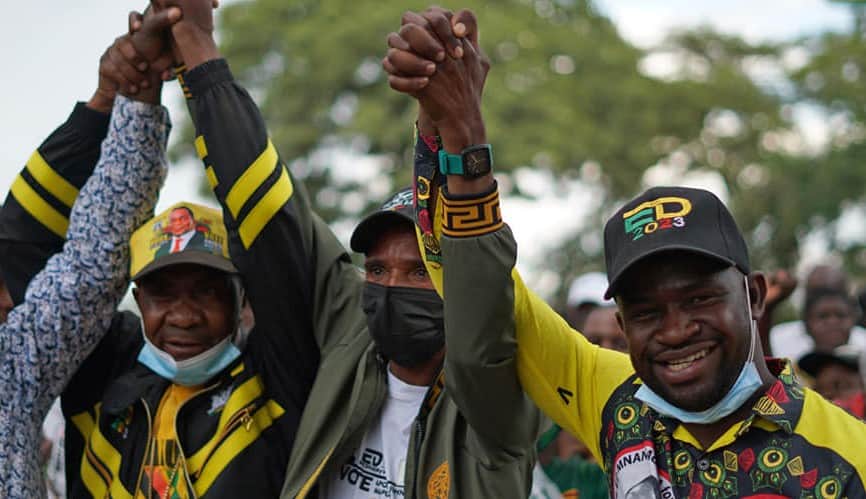When current Zanu PF leader and Zimbabwe President Emmerson Mnangagwa sensationally ascended to the country’s most-hankered-for political post following the dramatic political events that led to the flustering style, the degrading manner and the intolerably humiliating fashion through which his longtime boss and wartime master- the late Robert Mugabe- was dethroned in 2017, it followed suit that the Midlands mining town of Kwekwe would assume the theoretical status of playing native to the new president.
Mnangagwa, who once earned the moniker, Midlands Godfather, for his root-and-branch political domination in the typically ceaseless intraparty squabbles synonymous with Zanu PF, stays in the Sherwood area- located a few kilometers north-west of the Kwekwe central business district.
During the iron-fisted 37-year-tenure of his once-dreaded predecessor, Mnangagwa, who played a role in the landlocked southern African nation’s outstretched Bush War (historically known in the vernacular as Chimurenga/Umvukela), was rotationally designated to a multiplicity of cabinet posts by Mugabe as a way, peharps, of paying back to his then all-weather loyalty.
With an estimated population of 119 863 people within its city limits which makes the town the 7th-largest urban center in the country, the not-so-sprawling metropolis of Kwekwe is known for the electoral whammy it gave to Mnangagwa when, during the historic 2000 parliamentary elections, a virtually unknown opposition figure, a one Blessing Chebundo, trounced Mnangagwa in the poll contest for Kwekwe Constituency.
Despite the electoral humiliation, Mnangagwa continued to have influence in the politics of Kwekwe town in particular, and the Midlands Province in general.
2023- Who will rule in Mnangagwa’s backyard?
As the 2023 elections are fast approaching, the lingering question is- Who will be crowned King in the current Zimbabwe leader’s own backyard of Kwekwe?
The Kwekwe Central seat is currently held by youthful Judith Tobaiwa of the Nelson Chamisa-led Citizens Coalition for Change (CCC) party.
When Tobaiwa triumphed over Zanu PF candidate John Mapurazi in the 26 March by-elections that sought to come up with a substantive replacement to the late National Patriotic Front (NPF) legislator, Masango ‘Blackman’ Matambanadzo, press reports suggested that even Mnangagwa was livid over the electoral results in his own backyard.
But, for the ruling party to expect John Mapurazi to win an election of that magnitude was not only idling away the important hours of their God-given time, it was akin to hitting a stone in the hope that it will produce water.
Mapurazi was declared the party’s candidate at the eleventh hour, following the disqualification of popular candidate, Kandros Mugabe and Energy Dhala Ncube, who is also nephew to humiliatingly deposed former state security minister, Owen Mudha Ncube.
Kandros Mugabe and the Long Road to Parliament
The man-of-the-cloth, who is an Arch-Bishop at Zvipo ZveMweya Apostolic Church has for long been touted as the only Zanu PF candidate capable of ending the dominance by opposition political parties in Kwekwe Central constituency.
Without any shred of doubt, Mugabe, who is also the current Secretary of Finance for the Zanu PF Kwekwe District Coordinating Committee (DCC) commands majority support from Zanu PF supporters in the constituency and he also has the sympathy of, not only political neutrals but others from the CCC.
By her own admission, serving Kwekwe Central MP Judith Tobaiwa is said to have conceded that she could have lost the by-election on the 26th of March, had Zanu PF fielded Mugabe in the polls. After the demise of Blackman, Mugabe was largely believed to be the only person with the capabilities of replacing the much-loved NPF legislator after a rigorous campaign which pitied Dhala in the primaries.
To prove his worth, Mugabe had out-balloted Dhala in the eventually abandoned chaotic primary elections whose results were roundly rejected by the latter’s camp, who accused election officials of siding with the former’s camp.
Well-placed Zanu PF sources continue to shoulder the blame on President Mnangagwa’s blue-eyed boys- namely Mudha, and Local Government Minister July Moyo, for waging a bitter war against Mugabe, whom they reportedly do not want to see contesting in Kwekwe Central for the fear he might win the election.
The pair of Mudha and Minister Moyo has often been labelled the scapegoats for the “imposition of a Zanu PF ‘independent candidate’ Josiniah Maupa” in the 2018 elections, with the pursuit of dividing the vote.
Maupa, who contested as an independent candidate, used Zanu PF regalia during the campaigns and according to reports, the lawyer-turned-politician had blessings from Mudha and the Local Government Minister who are reportedly bent on derailing Mugabe’s parliamentary aspirations.
After Maupa, the two then reportedly seconded Dhala to challenge Mugabe (then Zanu PF Shadow MP) in the race to find the substantive replacement for Blackman.
The result of the subsequent Mugabe-Dhala fights resulted in the disqualification of the two aspiring candidates on the eve of the March 26 by-elections, giving birth to the candidature of a tired horse in the mould of the not-so-popular John Mapurazi.
Of Dhala and the ‘Energy’ to derail Mugabe
Despite his youthfulness, Energy Dhala Ncube is definitely not the ideal candidate for the ruling party in Kwekwe Central constituency. The fact that Dhala is a product of imposition from his dethroned uncle and others proxy to the Zimbabwe president, makes him an inappropriate candidate for the Kwekwe Central seat.
Dhala continues to move in the shadow of his uncle who is reportedly fighting a battle against the Mugabe camp.
He is, therefore, a product of the energy to derail Kandros Mugabe in the Zanu PF intraparty fights in Kwekwe.
It all waits to be seen if he will be able to wage a successful fight against the Zvipo ZveMweya Archbishop in 2023.
Zwnews













